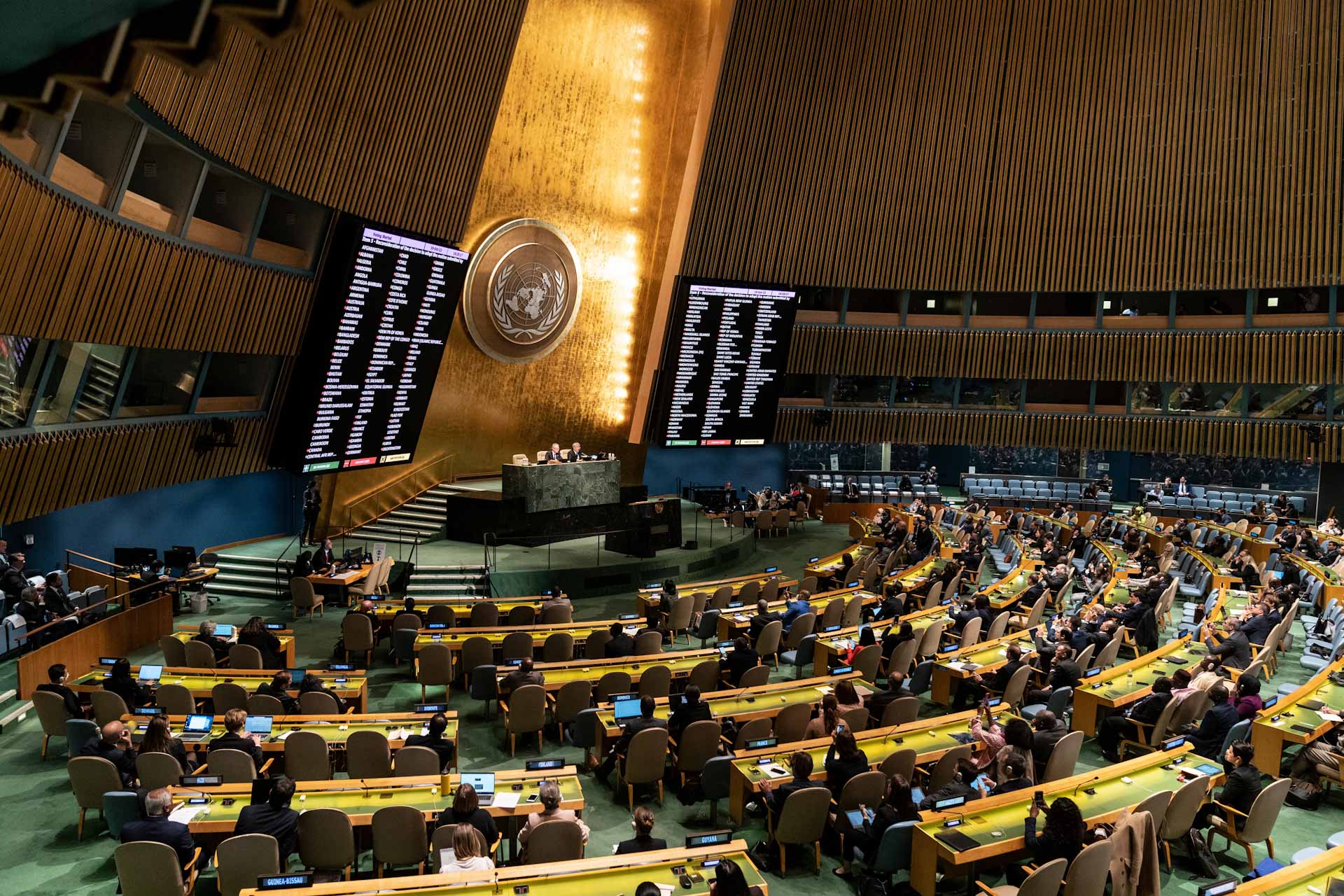This week almost all world leaders will, again, gather in New York for the annual UN General Assembly, a remarkable manifestation of multilateralism. Among the absent friends is Mahmud Abbas and some 80 Palestinian representatives, for – contrary to the tradition of the US host opening up the metropolitan city and the UN HQ without (much) restriction – this year the Trump administration has decided to deny visas for this particular group, claiming terror links, as if in anticipation of and as a counter-move to this UNGA session being dominated by the Palestinian question, specifically Israel’s war in Gaza and the expected announcement of a great many states of their decision to formally recognize Palestine as a state, leading to a situation in which almost all UN member states do recognize Palestine as a state and advocate the two-state solution as the preferred outcome of the “for ever” conflict. All but Israel and its tutor US.
A truly remarkable difference then exists between near-universal policy declarations, on the one hand, and the grim realities on the ground, one in which Israel under its current coalition leadership is actively engaged – in words and in deeds, in Gaza as well as in the West Bank – in preventing a Palestinian state and hence the two-state solution from ever being a reality. This difference will be demonstrated in the special session on this subject, based on the French-Saudi led conference and its resulting “New York declaration” of last summer. Speeches, deliberations and meetings during the course of the assembly will be held against the backdrop of continued warfare in Gaza and continued unrest in the West Bank, with daily reports of killed and starving children permeating the sessions, adding to the drama of this year’s Assembly.
But the reason why this year’s Assembly – its number 80 since its birth – could be singled out as particularly crucial is that alongside the Gaza drama world leaders will have to deal with the equally dramatic and demanding issues pertaining to Ukraine and Sudan (and of course many other issues). Being confronted by these massively demanding issues, the delegates will spend their time and energy with a mixture of formal sessions and listening to speeches – where Donald Trump will traditionally be nr 2 in line, setting the tone – and myriads of separate meetings, with worlds leaders utilizing the unique opportunity of the presence of all these colleagues. So two people in particular will be very busy, one being Donald Trump in view of all leaders insisting on having a tete-a-tete with him, the other Annalena Baerbock, former German foreign minister and now the chair of the Assembly.
The question now is what difference will or could the UNGA make, concretely, to the world crises facing it, this being a measurement of the current status of multilateralism in our troubled world. What is, for example, the impact of at least 150 member states, now including traditional friends of Israel like the UK, France, Canada and Australia, casting their vote for a Palestinian state and a two-state solution, if the UN Security Council is divided, and if, or since, Israel and the US stand firmly against it? Is there, in today´s world, such a thing as the soft power – soft, but still power, moral power – of a massive majority of UN member states?
Leaving these questions unanswered, it is clear that the three mentioned key issues, Gaza, Ukraine and Sudan, in this Assembly nr 80 differ as regards the potential role of the majority vote representing the international community, the difference depending on the extent to which the issues are dividing the Security Council and exemplify hard security. And here, obviously, Ukraine stands out as comparatively irrelevant to General Assembly deliberations and declarations – even though the Ukraine crisis is affected globally by rivalry between “the global West” and “the global East” for sympathy in the “Global South”.
But in the case of the Sudan catastrophe, by contrast, it is quite possible to imagine, or foresee, the General Assembly this year making a difference, after more than two years of devastating destruction and enormous civilian suffering. In a situation in which world attention – and world conscience – has finally discovered “the forgotten tragedy”, Sudan’s civil war, it could be expected that the UNGA will provide the opportunity and the collective motivation for a big push and a big change by enforcing an element of determination and unity of purpose – neighboring states included – that has been tragically missing so far.
The case of Israel-Gaza is, again, different, with the big difference this year compared to past experiences being global frustrations at the massive suffering inflicted and the protracted and vain process of seeking needed ceasefire, and the expected series of announcements concerning Palestinian statehood. While the latter will make little difference on the ground – as long as Israel has a rejectionist coalition government and as long as this government enjoys the unconditional support by the US government under Trump – an alarmist and dramatic mood at the Assembly can hardly avoid impacting both Israel’s international isolation, with all sorts of costs near-term and longer-term, and hence that of the US (with all sorts of costs). And hence a serious, added strain on transatlantic relations, already burdened by all the complications and dilemmas pertaining to Russia’s war with Ukraine.
It will be of considerable, indicative interest to see what Donald Trump will have to say about all these matters in his inaugural speech.
In summary, it remains to be seen to what extent this year’s UNGA will be internationally evaluated as a “last” chance, utilized or forsaken, for objectively needed multilateralism, or as a pathetic talk show of manifest irrelevance to the real problems of the world. Or, at least, as an indispensable meeting forum where all or most leaders are uniquely summoned. An arena rather than an actor.


